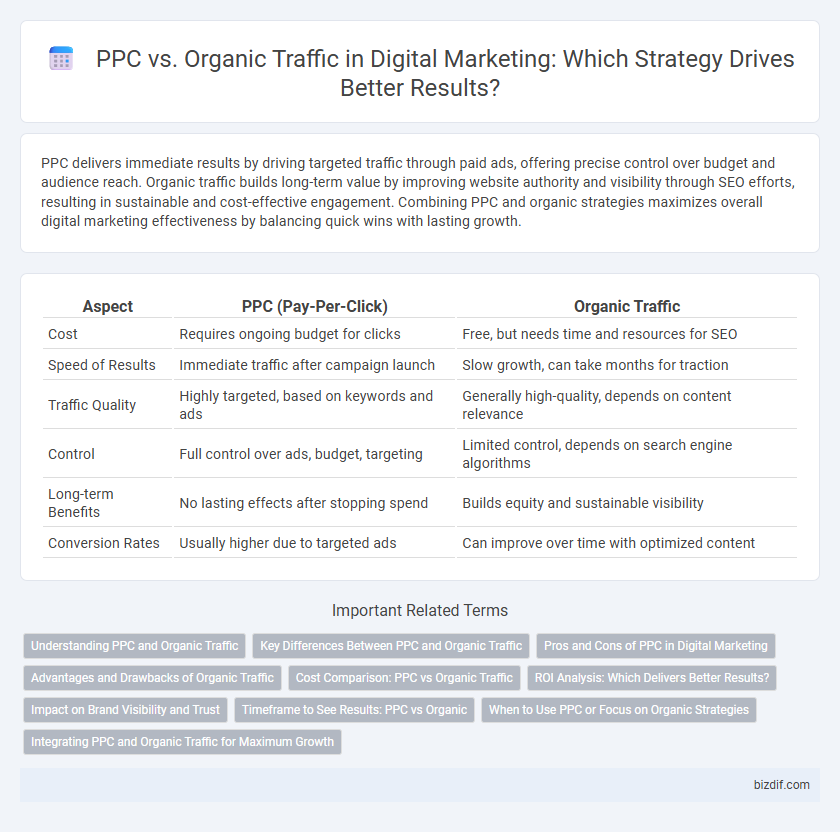PPC delivers immediate results by driving targeted traffic through paid ads, offering precise control over budget and audience reach. Organic traffic builds long-term value by improving website authority and visibility through SEO efforts, resulting in sustainable and cost-effective engagement. Combining PPC and organic strategies maximizes overall digital marketing effectiveness by balancing quick wins with lasting growth.
Table of Comparison
| Aspect | PPC (Pay-Per-Click) | Organic Traffic |
|---|---|---|
| Cost | Requires ongoing budget for clicks | Free, but needs time and resources for SEO |
| Speed of Results | Immediate traffic after campaign launch | Slow growth, can take months for traction |
| Traffic Quality | Highly targeted, based on keywords and ads | Generally high-quality, depends on content relevance |
| Control | Full control over ads, budget, targeting | Limited control, depends on search engine algorithms |
| Long-term Benefits | No lasting effects after stopping spend | Builds equity and sustainable visibility |
| Conversion Rates | Usually higher due to targeted ads | Can improve over time with optimized content |
Understanding PPC and Organic Traffic
PPC (Pay-Per-Click) traffic delivers immediate results by driving targeted visitors through paid advertisements on platforms like Google Ads, allowing marketers to control budget and keywords precisely. Organic traffic, generated from unpaid search engine results, offers sustainable, long-term growth by improving website rankings through SEO strategies such as keyword optimization, content creation, and backlink acquisition. Understanding the balance between PPC and organic traffic is essential for maximizing digital marketing ROI by combining quick lead generation with enduring online visibility.
Key Differences Between PPC and Organic Traffic
PPC traffic provides immediate visibility through paid ads targeting specific keywords, allowing marketers to control ad placement and budget precisely, while organic traffic relies on SEO efforts, generating sustainable, long-term visitors through optimized content and site authority. PPC campaigns deliver measurable ROI and detailed analytics, enabling quick adjustments based on campaign performance, whereas organic traffic growth depends on consistent content creation, backlink building, and algorithm updates. Cost structure significantly differs: PPC involves ongoing payment per click, contrasting with organic traffic's investment in time and resources without direct per-visit costs.
Pros and Cons of PPC in Digital Marketing
PPC (Pay-Per-Click) offers immediate visibility and highly targeted traffic, allowing advertisers to control budgets and optimize campaigns in real-time, but it can become costly over time without sustained investment. Unlike organic traffic, which builds credibility and long-term ROI through SEO, PPC lacks permanent presence and relies heavily on continuous spending to maintain performance. High competition for valuable keywords also increases CPC (Cost Per Click), challenging marketers to balance cost efficiency and conversion rates effectively.
Advantages and Drawbacks of Organic Traffic
Organic traffic offers sustained long-term growth by improving website authority and search engine rankings through quality content and SEO strategies. It generates highly targeted visitors who are more likely to engage and convert, though results require patience and consistent effort without immediate pay-per-click expenditure. However, organic traffic can be impacted by algorithm changes and intense competition, making it less predictable compared to paid PPC campaigns.
Cost Comparison: PPC vs Organic Traffic
PPC (Pay-Per-Click) campaigns involve direct costs for each click, typically requiring ongoing budgets that rapidly increase expenses, especially in competitive industries. Organic traffic, driven by SEO efforts, demands a lower direct monetary investment but requires substantial time and resources in content creation and optimization to achieve sustainable rankings. Over time, organic traffic tends to offer a more cost-effective and enduring return on investment compared to the continuous spending needed to maintain PPC visibility.
ROI Analysis: Which Delivers Better Results?
PPC campaigns offer immediate traffic and precise targeting, often yielding higher short-term ROI especially for time-sensitive campaigns or new product launches. Organic traffic, driven by SEO efforts, typically provides sustainable long-term ROI with lower ongoing costs but requires significant upfront investment in content and optimization. Analyzing ROI involves comparing conversion rates, acquisition costs, and customer lifetime value across both channels to determine which aligns best with specific business goals and industry dynamics.
Impact on Brand Visibility and Trust
PPC campaigns deliver immediate brand visibility through prominent ad placements, driving targeted traffic and measurable ROI, whereas organic traffic builds brand trust over time via consistent content quality and SEO optimization. Organic search fosters deeper user trust by appearing naturally in search results, enhancing perceived credibility and long-term customer relationships. Combining PPC and organic strategies maximizes brand exposure while balancing short-term impact with sustained trust development.
Timeframe to See Results: PPC vs Organic
PPC campaigns generate immediate traffic as ads appear instantly after launch, making them ideal for quick visibility and fast returns on investment. In contrast, organic traffic requires consistent SEO efforts over several months to build authority and rank on search engines, resulting in slower but sustainable growth. Marketers often balance PPC for short-term gains with organic strategies for long-term brand presence and cost efficiency.
When to Use PPC or Focus on Organic Strategies
PPC campaigns deliver immediate traffic and measurable ROI, making them ideal for time-sensitive promotions or new product launches. Organic strategies build long-term authority and sustainable traffic through SEO-optimized content, suitable for brand growth and competitive niches. Balancing PPC for fast results with organic efforts ensures optimized budget allocation and continuous online visibility.
Integrating PPC and Organic Traffic for Maximum Growth
Integrating PPC and organic traffic strategies leverages paid search data to refine SEO targeting, boosting overall website visibility and conversion rates. Combining PPC campaigns with strong organic efforts enables businesses to capture immediate traffic while building long-term audience trust and authority. Synergizing these channels maximizes marketing ROI by optimizing keyword performance, improving quality scores, and increasing click-through rates across search engine results pages.
PPC vs Organic traffic Infographic

 bizdif.com
bizdif.com